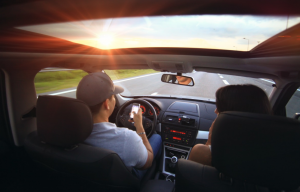
There is a lot of negligent behavior that can lead to a car accident. From drivers who text behind the wheel to speeding and aggressive driving, it’s true that there are a lot of things you can personally do to prevent an accident. Just don’t make the mistake of thinking you’re the only variable you have to consider when it comes to driving safely.
Unfortunately, passengers can cause accidents too, especially if those passengers happen to be your friends. Whether you’re driving friends home after school or you’re cruising around campus with your friends between classes, it’s important to make sure your passengers aren’t the reason why your car ends up in the shop and you end up in the hospital.
Here are some rules you may want to follow to ensure you and your passengers are safe while you’re behind the wheel.
Reduce the Number of Passengers in Your Car
Passengers have a huge effect on the safety of everyone in the vehicle, especially if the person operating the car is a teenager. If you’re in your teens, or even if you’re in your early 20s, you should seriously consider reducing the number of passengers in your car.
Only driving one passenger is better than driving two, and two is always better than three. Decide how many friends you’re comfortable having in the car and stick to that rule.
You may also want to consider which friends you give rides to. For example, giving three of your quietest, introverted friends a ride may not be a problem, but transporting three of your party friends could greatly increase your chances of getting into an accident.
Passengers Should Not Be Allowed to Use Controls in the Car
No matter who you decide to give a ride to, the passengers in your car should never be allowed to mess with shared controls. That includes adjusting the thermostat, changing the radio station, and adjusting the volume. Any controls that may affect the driver should be left alone.
There are some things your passengers can adjust. There’s no reason why they can’t adjust their seat or roll down their window, as these adjustments aren’t likely to surprise, startle, or irritate you while you’re driving.
Passengers Should Keep Their Volume Low
Did you know listening to the radio can contribute to distracted driving? That doesn’t necessarily mean you have to turn the radio off, but it does mean you should probably turn it down.
The radio isn’t the only thing in the car that can get loud. Passengers can get loud too, and when they do, it can be a huge distraction while you’re driving.
Make it clear to your passengers that they need to keep their volume low. That means talking quietly on their cell phones, conversing quietly in the backseat, and not singing loudly to their favorite songs on the radio.
Determine Personal Rules and Make Them Clear
Making it clear to passengers what controls they can and can’t use, in addition to keeping their volume down, are good places to start, but there are plenty of other rules you may want to consider sharing with your passengers.
A few passenger rules you may want to consider include no:
- Feet on the dashboard
- Eating or smoking in the car
- Littering or leaving garbage in the car
- Slamming the doors
- Backseat driving
Just make sure you’re willing to stick to the rules you decide you want your passengers to follow. If you have a friend who regularly breaks one of the rules and it’s driving you crazy, it’s totally okay to refuse to give them a ride in the future, no matter how much they may complain.
Impaired Drivers Should Always Sit in the Backseat
Being the designated driver is a great way to keep everyone from getting into serious trouble. Unfortunately, it won’t necessarily keep you safer. Having drunk passengers can be just as dangerous as having a drunk driver because they can be a huge distraction.
That doesn’t mean you should just give up and drink too, and it doesn’t necessarily mean everyone has to stay home. You can keep yourself and everyone else in the car safer if you require impaired drivers to sit in the backseat where they will be less of a distraction.
Give Passengers a Job When Driving in an Unfamiliar Area
Much of the time, when you’re driving with friends in the car, you’re probably going somewhere you’re familiar with. There’s no need to ask passengers to help if you’re driving to or from school, but if you’re taking a trip or driving on an unfamiliar side of town, it’s a good idea to give your passengers a job.
For example, on a trip, the passenger sitting in the front seat can be the navigator. That way, you don’t have to take your eyes off the road to research your next turn. Passengers in the backseat can keep their eyes open for rest stops, restaurants, and parking spots.
Everyone Needs to Wear a Seatbelt
Most of the reasons why everyone should wear a seatbelt center around the fact that seatbelts can keep everyone from getting seriously injured if you’re in an accident. Even by following these passenger tips, you can still find yourself in an accident, and making sure everyone is wearing a seatbelt is a great way to prevent injuries.
Seatbelts have another benefit—they can keep passengers in their seats. Friends who would otherwise climb over seats or stand through the sunroof will be stuck in their spots where they are less likely to distract you while you’re driving.
By all means, follow the rules of the road, put your cell phone in the backseat, maintain your vehicle, and practice defensive driving techniques. Just don’t forget that the passengers in your vehicle can have a huge impact on your safety too! With the tips on this list, you can ensure everyone in your car is as safe as possible.
